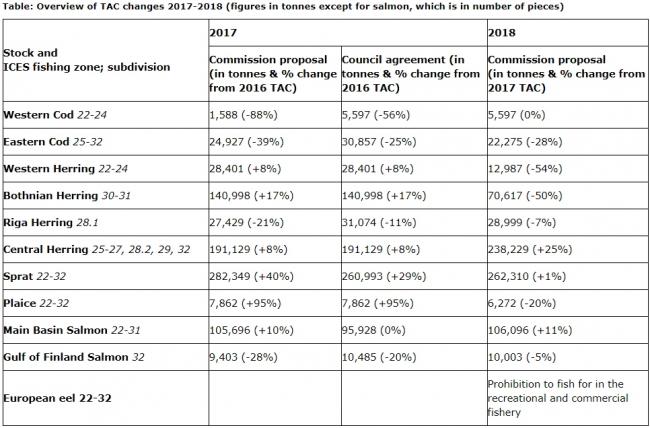Commission proposes Baltic Sea fishing opportunities for 2018 with increased quotas for herring and salmon
On August 29th, the Commission adopted a proposal for fishing opportunities in the Baltic Sea for 2018.
In particular, the Commission proposes to increase catches for Central Herring, Sprat and the Main Basin Salmon stocks, and to maintain the number of catches for the important stock of Western Baltic Cod. For the remaining stocks the Commission proposes reducing catches. This year's proposal also includes a ban on Baltic Eel fisheries, not traditionally a part of the annual allowable catch proposals but a necessary step due to alarming scientific evidence and historically low levels.
Karmenu Vella, Commissioner for Environment, Fisheries and Maritime Affairs, said: "We are proposing a balanced package that will ensure sustainable fisheries in the Baltic Sea. The good news is that important quotas for Baltic herring and salmon can be increased. Responsible management measures by Member States and the fishing industry are paying off. Now we must learn from these success stories and act urgently for those stocks that are still in a worrying state, like the European eel."
The proposed total allowable catches (TAC) for herring, cod, sprat and salmon stocks are based on scientific advice from the International Council on the Exploration of the Seas and follow the Baltic multiannual management plan adopted last year by Member States and the European Parliament.
Efforts by stakeholders in recent years have already succeeded in rebuilding important stocks in the Baltic. Between 2012 and 2016, for example, the overall biomass of pelagic stocks increased by 50%. But further action remains necessary to ensure all stocks are exploited at sustainable levels.
European Ministers for Fisheries will now examine the Commission proposal, with the aim of adopting it during the Fisheries Council of 9-10 October.
Herring
The largest proposed increase (25%) for 2018 concerns the Central Herring stock. Responsible management of this stock has already borne fruit in recent years. This has allowed the fishing industry to reap the rewards and offer consumers a stable supply. Scientific advice for the Western Herring stock revealed a significant negative change in the state of the stock. The Commission is therefore proposing a corresponding reduction of 54% for the catch of 2018. For Herring in the Gulf of Bothnia the Commission is proposing a reduction of 50%, following the plan that was agreed by Member States and the European Parliament last year.
Cod
Western Baltic Cod is an important stock for many small-scale fishermen, and has been at very low levels in recent years. For 2017 allowable catches were reduced by 56% compared to 2016, and additional measures like closure periods and limiting recreational fishing were taken. Currently, the stock is still below the threshold of biologically safe limits. The Commission therefore considers it necessary to maintain existing measures to ensure that young cod can reproduce and help rebuild the stock. For Eastern Cod, scientists advice that catches are significantly reduced as the stock remains data-limited and scientists detect a slow growth. The Commission is therefore following a precautionary approach and proposes a reduction of 28%.
Salmon
The scientific advice for Main Basin Salmon, a stable stock, allows for an increase in catches by 11%. This reflects the responsible management of the fisheries by the industry. Thanks to this the number of returning spawners in the rivers of our Member States has reached record levels, with the Torne river now home to the world's largest salmon population.
Eel
The European Eel stock has been at a historically low level since the late 1990s. It is listed in Appendix II of the Convention on International Trade in Endangered Species (CITES), on August 29th. In 2007 the EU adopted measures to allow this stock to recover. However, ICES advice published in May 2017 indicates that these measures have not been sufficient and the stock is still in a critical state. The Commission therefore proposes to ban all marine eel fisheries in the EU waters of the Baltic Sea for 2018. This ban would apply to commercial and recreational fishing. This also means that all eels caught accidentally will have to be released immediately. In addition, the Commission is planning to evaluate the Regulation on the recovery of the European eel.

Source: European Commission
- 426 reads
Human Rights
Fostering a More Humane World: The 28th Eurasian Economic Summi

Conscience, Hope, and Action: Keys to Global Peace and Sustainability

Ringing FOWPAL’s Peace Bell for the World:Nobel Peace Prize Laureates’ Visions and Actions

Protecting the World’s Cultural Diversity for a Sustainable Future

Puppet Show I International Friendship Day 2020

